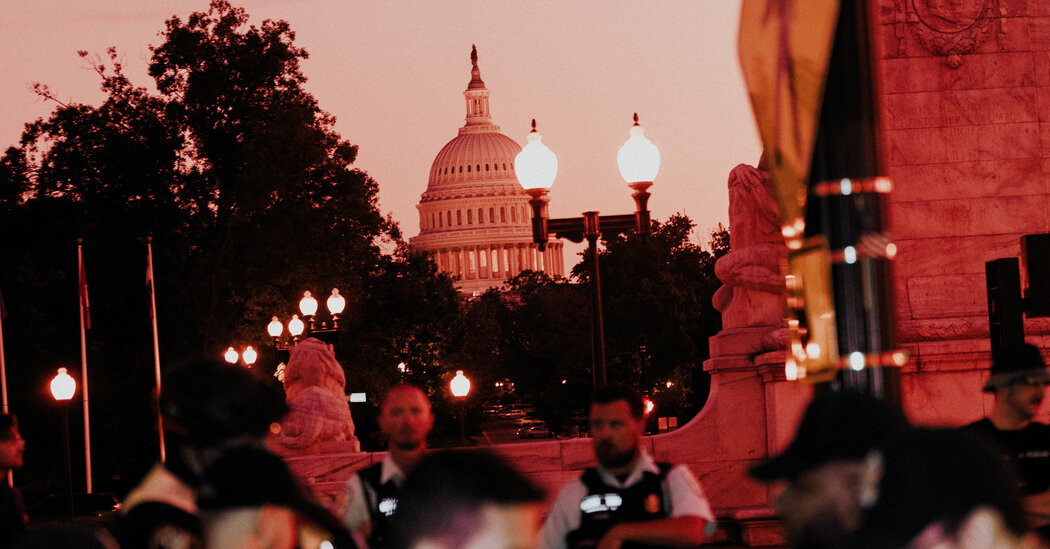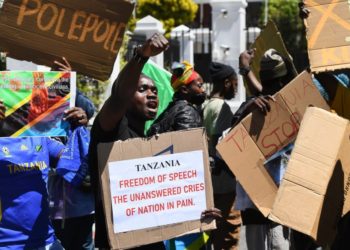Emily Bazelon: Hi David. There are many legal controversies for us to dig into. Let’s start with the news — the argument at the Supreme Court on Wednesday in the case challenging President Trump’s tariffs. Do you think it went as badly for the Trump administration as I do? Were you surprised by anything? And how were you counting up the justices’ votes?
David French: Hi Emily! I agree with you that, on balance, the argument did not go well for the Trump administration, but it wasn’t a slam dunk on the anti-tariff side either. There was one surprising element to me — two of the court’s most conservative justices seemed to be sharply at odds with each other during the argument. Justice Gorsuch’s questioning was damaging for the administration’s case, while Justice Alito very clearly planted his flag for Trump’s tariffs.
At a couple points, Alito virtually took over the oral argument, pressing Neal Katyal, one of the attorneys who represented the plaintiffs challenging the tariffs, for several minutes at a time on a number of fronts. His most effective line of questioning concerned whether the term “regulate” could encompass imposing a fee. I thought Katyal handled Alito’s questions well, but I do think that exchange slightly shifted the momentum of the argument, at least for a time.
Based on the oral argument, I’d say that four votes seem strongly against the administration’s position (Gorsuch, Kagan, Sotomayor and Jackson), two are softer votes against the administration (Barrett and Roberts), two seemed moderately sympathetic to Trump’s case (Kavanaugh and Thomas), and Alito was ready to defend Trump’s tariffs like he was making a goal-line stand in the fourth quarter of the Super Bowl.
Is there any moment that truly stood out to you?
Emily: Two. Barrett zeroed in on the text of the statute Trump has relied on, in a way I thought was devastating. The question is whether the phrase “regulate … importation” gives Trump the authority he’s seeking. Barrett pointed out that those words are not tariffs or duties or imposts (that last one was not on my vocab list, I confess) or any of the other terms Congress traditionally has used for taking money from foreign sellers of goods that come into the United States. Barrett asked for an example, any example, of another law that functions the way the solicitor general, D. John Sauer, says this one does — “Can you point to any other place in the code or any other time in history where that phrase, together, ‘regulate importation,’ has been used to confer tariff-imposing authority?” she said.
Sauer could only come up with the precursor statute to the one Trump is using, which Barrett already knew about.
My point is that Justice Barrett, a determined textualist, seems very doubtful that the words in the emergency law Trump used to impose the tariffs mean what he says they mean. For textualists, that should be a death knell.
Alito, however, clearly read the same words differently. He thinks regulating importation equals tariffs. To me, it’s a great example, among many, of why textualism does not point to The One True Answer of how to interpret a law in the way that adherents of this method often claim it does.
The other moment was Gorsuch’s closing mic drop. “It does seem to me — tell me if I’m wrong — that a really key part of the context here is the constitutional assignment of the taxing power to Congress,” he said. “The power to reach into the pockets of the American people is just different, and it has been different since the founding.”
In other words, he’s suggesting that Trump is usurping one of the most important functions that the founders gave to Congress to ensure that the president would not be able to act like a king. That’s the crux of why Trump’s claim of authority here is such a blow to the constitutional separation of powers. Tariffs, as some of the justices pointed out, are taxes by another name. They raise revenue by imposing costs that companies can eat or pass on to consumers.
If the president can declare an emergency at a whim, as Trump has done by declaring a run-of-the-mill trade deficit a national emergency, and then tariff whoever he wants at whatever rate, which he has also done — Ontario, how dare you run an anti-tariff ad that uses Ronald Reagan’s actual words against this president? — then Congress is not a coequal branch. Not even close. Congress is just … sitting on the sidelines. The president can dun countries or maybe even companies he doesn’t like, raise all the revenue he wants, and Congress can’t do a thing about it unless it can come up with a veto-proof majority to revoke his self-declared emergency powers. Justice Gorsuch pointed out that under this scheme, as a practical matter, Congress can never get its taxing power back.
David: That Gorsuch quote is key — it felt to me like he was summarizing his own theory of the case, a theory rooted in the founding ideas of the country. Taxation is a core enumerated power of Congress, and the idea that it delegated its core enumerated authority through a broad, vague statute governing international economic emergencies seems to strike Justice Gorsuch as implausible.
As you note, there was another portion of the oral argument that brought this point home. Justice Gorsuch asked the solicitor general about the “retrieval problem” — the difficulty of taking power back from the president. It takes only a bare majority of Congress (with presidential assent) to delegate the power, but a supermajority to retrieve the power — unless a president actually wants to surrender the power Congress has given him or her.
This creates, in Gorsuch’s words, a “one-way ratchet” that results in the president accumulating more and more power at the expense of the legislature.
Gorsuch’s observation has profound implications beyond the tariff case. One way that administrations expand presidential power is by arguing that the judiciary isn’t the proper branch to check the president, that in some instances only Congress has the authority.
But, as Gorsuch notes, that check is often completely illusory in the absence of congressional supermajorities. I can think of a number of circumstances where Gorsuch’s observation is relevant, including — most notably — in the disputes over Trump’s deployments and attempted deployments of the National Guard. The administration is arguing that the courts shouldn’t second-guess the president and that if Congress wants to amend the statute that grants him the power to deploy the troops, it can. But is that a real check when Congress can’t act on its own absent a veto-proof supermajority?
We’ve been talking a lot about the weaknesses in the administration’s position, but I fear that might leave readers with the wrong impression — that the outcome of this case is a foregone conclusion. I think the administration has a path to victory here. It can argue that the words “regulate … importation” in the International Emergency Economic Powers Act (the full name of the statute before the court) should be read to encompass tariffs, especially when combined with the broad discretion presidents enjoy to conduct foreign affairs.
Emily: Yes, good point. The administration could still win. Its best argument is that the statute at issue here gives the president practically unfettered power because it’s “foreign-facing.” The idea is that in the context of international affairs, Congress gives the president extra deference to respond to “ever-changing national security threats and diplomatic challenges,” as Justice Kavanaugh wrote in a concurring opinion in a different case in June. And so in this one domain, foreign relations, the major questions doctrine — the idea that the executive can’t take large steps without clear congressional authorization — doesn’t apply.
That would give the court a justification for waving Trump’s tariffs through even though the conservative justices blocked President Joe Biden from forgiving student loans based on a law that granted capacious but nonspecific authority in the event of an emergency. Congress doesn’t “hide elephants in mouseholes,” as Justice Antonin Scalia put it. That’s the guiding metaphor of the major questions doctrine. But perhaps the Republican-appointed justices find a way to let Trump, a Republican president, tuck an elephant into his emergency statute so he can keep his tariffs, as his heart desires?
I’m not sure there are five votes for this problematic approach, however. Chief Justice John Roberts, another swing-ish vote, asked tough questions of both sides, and I don’t feel sure of where he’ll land. But he did say of the major questions doctrine, “It might be directly applicable.” Which was not what Trump and the solicitor general wanted to hear, right?
Can we go back to your point, or really Justice Gorsuch’s point, about the one-way ratchet that takes power from Congress and shovels it toward the president? What I heard today from at least two conservatives (Gorsuch and Barrett) and possibly a third (Roberts) was real-world awareness of the dynamic that is making the presidency loom ever larger in our scheme of government at Congress’s expense. More than anything else, that gave me a sense of relief.
In so many rulings on the emergency docket, since Trump took office, the court’s conservatives have seemed willfully blind, obtuse even, about the power grab they are witnessing and abetting. Today they seemed wise to it. Maybe I’m being too optimistic that cleareyed questions will translate into an actual majority opinion blocking Trump. But it seemed more plausible than when I woke up.
OK, on to another question about a presidential abuse of power that’s taking my breath away. What do you make of Trump’s insistence on blowing boats — and the people in them — out of the ocean based on no specific public proof of drug-smuggling and “narco-terrorism?” This is Trump’s made-up rationale for killing Venezuelans or other foreign nationals who come into the U.S. military’s cross hairs at sea.
Trump says he can do this because he has “determined” in a confidential notice to Congress that the United States is in a formal armed conflict with drug cartels. But the military is not permitted to intentionally target civilians who pose no threat of imminent violence, even suspected criminals. (I can’t believe I have to write that down, it seems so bedrock to human rights and the rule of law.)
You’re a former military lawyer. Is this like killing enemy combatants associated with Al Qaeda, as presidents have done before, or other drone killings abroad? Or is Trump doing something different and more sinister here by causing what now comes to at least 67 deaths in 16 strikes at sea?
David: Trump is doing something different and much more sinister. I know that people of good will disagreed with the breadth and extent of the Bush or Obama military campaigns against Al Qaeda, but both presidents were operating under a clear grant of congressional authority. The post-9/11 authorization for use of military force gave American forces the constitutional authority to conduct a military campaign against Al Qaeda and those who harbored it, and the Al Qaeda attacks on America gave us the right to respond under international law. We were on solid legal and moral ground.
By contrast, not only is there no congressional authority empowering Trump’s attacks, they also violate international law. Crime and war are not the same thing, and Trump is reacting to crime as if he’s responding to an imminent armed military attack on America. In reality, he’s striking suspected drug traffickers who are sailing very far from American seas who are the farthest thing from an imminent threat.
Don’t think for a moment that the only alternative to armed strikes is to simply let the boats sail away. The normal course of action is to stop a suspected drug boat, search it for drugs, and arrest and question its crew if incriminating evidence is found. That’s preferable on moral, legal and practical grounds as opposed to simply blowing them away from the air. It’s much more difficult to gather intelligence and information from dead men.
The military has assisted in antidrug efforts in South America for a long time. We’ve provided logistical and intelligence support and have even provided intelligence to other militaries in their efforts to shoot down planes suspected of carrying drugs (this program resulted in the horrific accidental killing of an American missionary and her daughter in Peru in 2001 — demonstrating, as if we needed more proof, that our intelligence is not always airtight).
But we’re dealing with something far beyond providing assistance to foreign governments when they use force. We’re directly attacking suspected criminals on the president’s sole authority. What is the limiting principle here? If crime is now war, then who can’t the president kill?
Emily: I don’t think Trump recognizes a limiting principle unless he’s forced to. That’s one of his signatures.
One thing that could be said for Trump in his first term was that he seemed wary of using military force. But now he seems to be baiting Venezuela into a war that could topple its government because he doesn’t like President Nicolás Maduro. What are we doing here?
David: Emily, let’s stick with the president and military power for a moment. Last week the Supreme Court gave us an interesting hint that it might be skeptical of Trump’s attempted National Guard deployments to Portland and Chicago. It ordered the parties in Trump v. Illinois — the case challenging the Chicago deployment — to file briefs addressing the question, “Whether the term ‘regular forces’ refers to the regular forces of the United States military, and, if so, how that interpretation affects the operation of 10 U. S. C. §12406(3).” This same question is also directly relevant to the Portland deployment, which was based on the same statute.
In plain English, they’re asking the administration whether its National Guard deployment is premature. Does Trump have to show that Portland and Chicago are so out of control that the regular Army can’t preserve the ability to execute the laws of the United States? Or does he merely have to show the civilian law enforcement isn’t up to the task?
This implies that he may not be able to invoke 10 U.S.C. §12406 unless he’s already called out the active duty military pursuant to the Insurrection Act, and the active duty military couldn’t handle the disorder without National Guard reinforcement. In other words, the statute Trump is using isn’t a first resort in the face of mild disorder, but rather a break glass in case of emergency last resort in response to a grave crisis.
I’m pretty sure that question is a sign that the court has some rather serious qualms about the deployment (especially since the Seventh Circuit’s injunction against the deployment remains in effect). What do you think?
Emily: Thank you for the plain English. I admit that I wanted to skip this part of the discussion because it makes me a little bleary. There are plenty of reasons for the courts to stop Trump’s deployment of the National Guard without this distinction about civilian law enforcement and an Army. And if Trump moves on to using the Insurrection Act to put military troops on the ground in American cities, then this debate goes out the window, right?
But you are right to insist. So far, Trump has only gone with the federal statute., so one step at a time. Maybe invoking the Insurrection Act would bear a greater political cost, so then let him bear it.
And I think you’re right. The only reason for the Supreme Court to ask for additional briefing is that they think it may be relevant to their analysis. If they want to resort to a rather technical reason for stopping Trump from treating the National Guard like windup toys, then OK, sure, let’s have a round of talking about what “regular forces” means.
Speaking of additional briefing, for me the hackiest moment of the argument today was Justice Alito suggesting that the court should consider not just whether Trump’s tariffs are legal based on the statute he cited, but also based on other statutes he didn’t cite. Which just happen to demand more process (review, findings) and set more limits before tariffs can pop into place. Since when does the court do business like this — supplying the rationale that the president, with all his expert lawyers, did not?
David: I didn’t find Alito’s comments hacky. I’ve actually been a litigant in a case where the court decided the outcome on the basis of legal issues that no one briefed at all! When a judge gets a legal idea, he or she is going to explore it, even if it hasn’t been central to the case so far.
Emily: I take your point. Still, it seems different to me when the president has made a strategic choice about which statute to use. Anyway, sorry, we were on to other topics! I wonder what you think about the Trump administration’s refusal to pay about half of the SNAP benefits that are due to 42 million recipients this month. Trump also himself threatened to defy the court order to make the payments. He said on social media that people would only get their SNAP when the government shutdown ends. It’s his effort to pin blame on Democrats. This has to be terrible politics. It just has to be. He is literally taking food out of people’s mouths to score points.
Trump’s spokeswoman quickly dialed things back, saying the administration was complying with the court’s order. That reassurance is pretty thin, however, given that the promise is only partial payment, on some delayed timeline. I feel like I’ve seen this before, with all the foot-dragging and gamesmanship in the administration’s response to the judge who ordered the resumption of foreign-aid payments beginning in February.
And once again, even if Trump is just blustering, it is bad for the rule of law for the president to go around acting as if lower court orders are optional. They are not. These are the things that make this administration different from the others in my lifetime. It’s the reckless disregard of limits, and all for what — making poor people worry about where their next meal is coming from?
David: I share your concern for the way in which the Trump administration is both flirting with outright defiance of lower courts and engaged in rather obvious efforts to discredit their rulings. We have an appellate system for a reason, and if a district-court ruling is obviously bad, then you don’t have to defy anything — just go win your case on appeal.
But the Trump administration’s core approach seems to be its own version of “move fast and break things.” Adverse court rulings mean that he can’t move as fast as he likes, and speed is a core part of his strategy. If he moves quickly on multiple fronts, then it’s hard for the political opposition to concentrate its response. He’s trying to demolish the barriers against executive overreach as quickly and thoroughly as he demolished the East Wing of the White House.
Our system, however, was intentionally designed to slow things down, to filter legal reform through the legislative, executive and judicial branches. Different branches get a say in the executive’s actions, and that’s unacceptable to Trump. SNAP benefits and National Guard deployments are very different things, but they share in common Trump’s desire to move quickly and decisively against his political foes, without any intervention from the courts, or anyone else.
Emily: On SNAP, he seems wrong that he’s acting against his political foes, to his own detriment. Yes, Democrats care about SNAP. But many recipients are part of Trump’s white, non-college-educated base. They are hurting. Which might help explain why Trump’s approval rating has been meaningfully slipping of late.
David, last month I promised you I’d watch the show “Broadchurch,” and I am tempted to pretend that I did. But also last time my kids quizzed me on whether I’d really watched “Suits,” and my husband had to vouch for me. So now I’m going to confess that I dropped the ball on “Broadchurch.” Not that you care!
Have you seen “Task?” I loved it. The procedural is the thread for some poetry, really, about how people overcome the most difficult forms of loss. I’m still thinking about the characters, especially Robbie and Maeve and the kids. Also, it is full of people from many walks of life speaking the language of Del Co, Delaware County, Pa. I grew up in Philadelphia and these are the accents and inflections of my childhood (“wooder” for “water” 4evah). Isn’t it funny how after a certain age, sounds and smells that are familiar, no matter what they are, are cause for nostalgia? Proust and the madeleine except the madeleine is made at Wawa.
David. Ha. “Task” is incredible. Just great, great television. I’ve described it to friends and family as a “hate triangle” — the F.B.I. versus home invaders versus a biker drug gang — but the thing that really makes the series is the way in which each character feels grounded and real, and — as you note — its setting adds to the authenticity.
I don’t want to spoil anything, but the ending of the series is absolutely perfect. Sometimes even the best series find it difficult to land the plane, but this show was near-perfect, from start to finish.
Your fumble on “Broadchurch” (which is not really a fumble!) reminds me of the great way my dad gives people books. He says, “I’m giving you two gifts — the book and a promise to never ask if you read it.” The same should apply to streaming recommendations. Giving a recommendation imposes no obligation on the recipient to watch!
I enjoyed this conversation very much. See you next month, when I suspect we’ll disagree a bit more.
Emily: Me too, on both counts. Also I love that from your dad. Generosity of two kinds.
The Times is committed to publishing a diversity of letters to the editor. We’d like to hear what you think about this or any of our articles. Here are some tips. And here’s our email: [email protected].
Follow the New York Times Opinion section on Facebook, Instagram, TikTok, Bluesky, WhatsApp and Threads.
Emily Bazelon is a staff writer at The New York Times Magazine. @emilybazelon • Facebook
David French is an Opinion columnist, writing about law, culture, religion and armed conflict. He is a veteran of Operation Iraqi Freedom and a former constitutional litigator. His most recent book is “Divided We Fall: America’s Secession Threat and How to Restore Our Nation.” You can follow him on Threads (@davidfrenchjag).
The post A Fresh Way for the Supreme Court to Split appeared first on New York Times.




